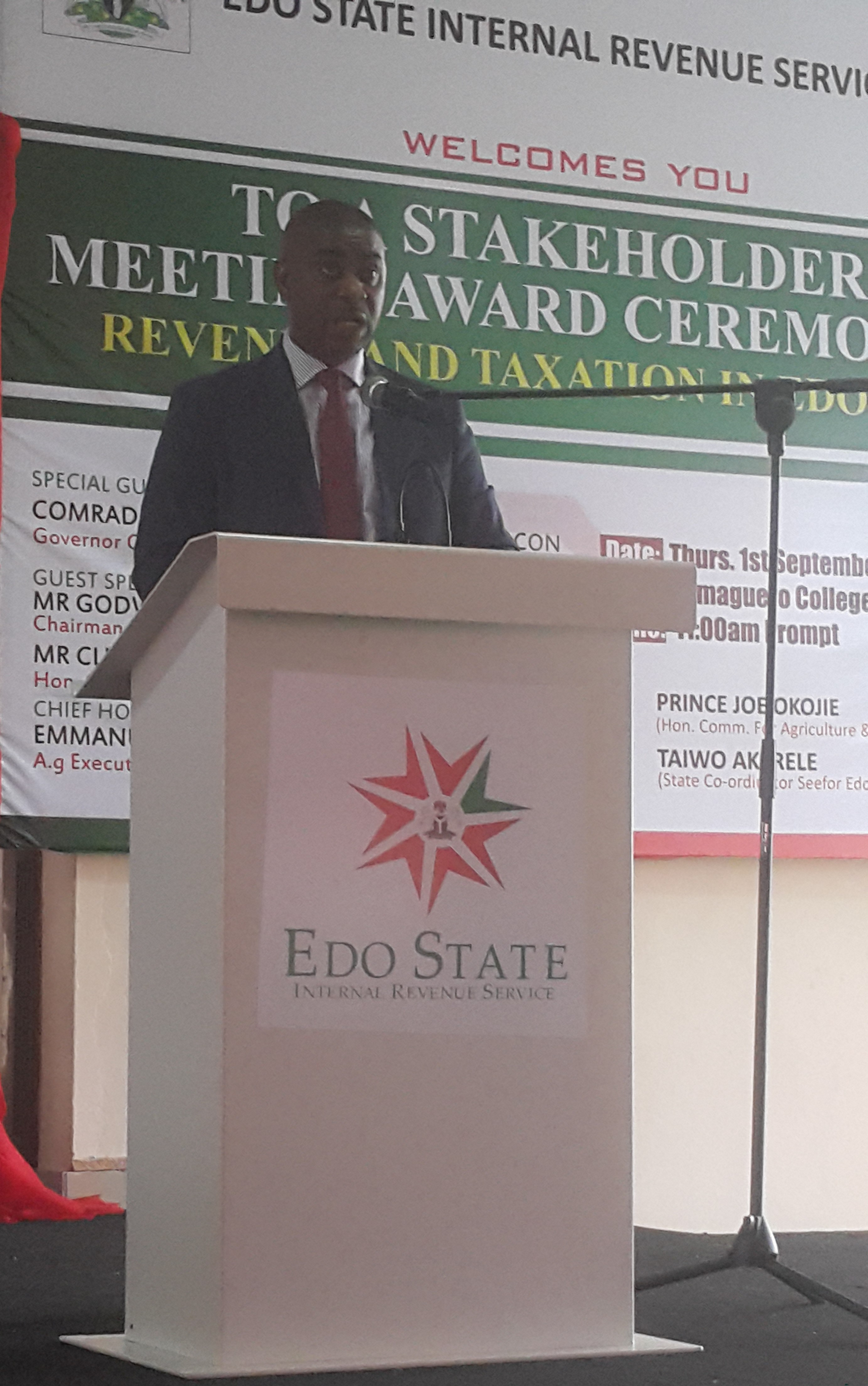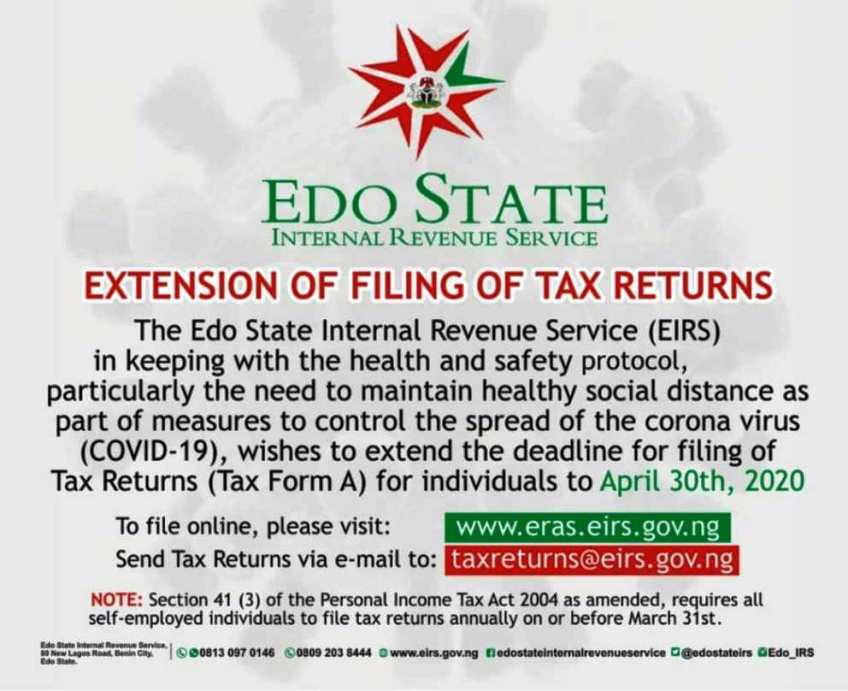ADDRESS BY EMMANUEL I. USOH Esq., ACTING EXECUTIVE CHAIRMAN, EDO STATE INTERNAL REVENUE SERVICE (EIRS), ON THE OCCASION OF THE ONE-DAY STAKEHOLDERS MEETING/AWARD CEREMONY HELD AT IMAGEURO MULTI-PURPOSE HALL ON 1ST SEPTEMBER, 2016
PROTOCOL
It gives me great pleasure to welcome the Comrade Governor, Comrade Adams Aliyu Oshiomhole, Governor of Edo State; our Revered Royal Father, The Edaiken N’Uselu, Crown Prince Ehenede Erediauwa and other esteemed guests to this stakeholders meeting/award ceremony being hosted by the Edo State Internal Revenue Service.
This ceremony was put together in keeping fate with the tradition of the Revenue Service in acknowledging the commendable effort of some taxpayers worthy of emulation by others. It is also to let people know that it is possible to be a faithful taxpayer and indeed there are faithful taxpayers in Edo State.
Distinguished ladies and gentlemen, you will all recall that at the inception of the present administration in November, 2008, the economy and particularly the infrastructural facilities in the State, to say the least, were in very embarrassing conditions and the Government, recognizing the absolute necessity to change the narrative of the State, decided to reform and re-position the Board of Internal Revenue so as to build an efficient, accountable, transparent and enduring tax and revenue administration system in line with global best practices in the State.
The objective was to optimize Internally Generated Revenue (IGR) for the provision of basic amenities and public infrastructure while also embarking on purposeful moves aimed at institutionalizing the tax/revenue administration system and the Comrade Governor’s philosophy of a people- and result-oriented Government into the fabric of governance in Edo State.
Consequent upon this critical objective, a new Internal Revenue Service was established and granted autonomy with the enactment of the Edo State Revenue Administration Law, in December, 2012. Part of the innovation is to build an autonomous Revenue Service that will be anchored on integrity, transparency, innovation, professionalism, and results.
You may wish to know that before the inception of this administration, the Internally Generated Revenue (IGR) averaged N280 million per month. With the various reform programmes of the administration aimed at eliminating inefficiency in the revenue collection process and plugging all avenues of leakages, the monthly IGR performance witnessed a steady rise that climaxed in the generation of over N2 billion in December, 2011.
However, the implementation of the amendment to the Personal Income Tax Act, 2011 which granted huge tax reliefs to majority of taxpayers, with a view to increasing their disposable income following the removal of subsidies on petroleum products resulted in a drop of revenue by about 48% under the PAYE. This scheme accounts for about 60% of IGR accruable to the State Government, thereby leading to a significant drop in monthly IGR to about N1.5 billion on the average.
The situation is beginning to improve again and as at today, the average IGR of the State is about N1.7 billion.
I will not conclude this address without talking about the misconceptions in the taxation system in Edo State, particularly the issue of “double taxation”, “excessive and punitive taxation” and “taxation of religious houses” which are now becoming popular among some political actors in their campaigns.
Generally, ‘Tax’ can be said to be a compulsory payment imposed by Government on every citizen of a Country or State who earns an income. This definition implies that everyone has to pay taxes to Government. Other sources of revenue to government besides tax are rates, fees, levies, penalties and fines etc collected by government Ministries, Departments and Agencies for registration, licensing and approval of businesses as well as services rendered by these government establishments.
The issue of double taxation arises from the inability of some persons to distinguish between taxes and money paid as rates, fees, levies, penalties and fines to different tiers of Government or Agencies backed by various legal instruments, be it Federal, State or Local Government. People just believe that any money paid to government is a tax and as such they complain of double taxation.
This administration is however not oblivious of the extortion been perpetrated by some staff of these MDAs as well as Local Government Councils in the course of carrying out their official responsibilities. People have been disciplined/dismissed on account of their involvement in these extortion exercises carried out on members of the public by individuals (rich or poor) for their selfish goals. As a means of curbing this menace, the Edo State Internal Revenue Service has put machinery in place to collaborate with the various Local Government Councils to ensure that members of the public are not harassed under the guise of collecting revenue. We are also making plans to publish a list of all revenue collectible by the State and Local Government Councils including the amount involved so that it will no longer be at the discretion of the revenue collectors to decide what to be paid.
Another issue being erroneously used for campaign by some political actors is the allegation that the tax system in Edo State is punitive and excessive. This again is not correct because the tax law in operation in Edo State is a Federal Law whose provisions, State Governments have no control over. What we decided to do in Edo State is simply to endure strict adherence to the law. This is why, even when people take us to court, we have always come out victorious. The real issue is that people are not abreast with the basic provisions of PITA.
They want us to continue with the old system where the tax authority would enter into negotiations on how much tax to be paid.
In fact, in the case of Maatschappij B vs. Federal Inland Revenue 2011 4TLRN at page 97 per M. B. Belgore it is said that
“payment of tax or who is entitled to pay tax is an issue of law not of arrangement, contract or compromise”.
This means that tax payment is not by negotiation because the law specifies exactly how chargeable income is derived and subsequently how the tax to be paid is computed.
It may interest you to know that in 2014, the Manufacturers Association of Nigeria (MAN) declared Edo State as the most tax friendly environment in Nigeria.
I do not think that people have cared enough to find out why Edo State that was previously described as a “Civil Service State” has been able to meet up with its financial responsibilities such as paying as and when due; the salaries of the State’s Civil Servants, monthly pensions of its pensioners and honouring contractual obligations in addition to other responsibilities. One of the main reasons Edo State is able to achieve all of these at a time when other richer states are owing several months of salaries to their workers is due to a number of measures introduced by government to bring about efficiency, accountability and transparency not only in government financial operations but also in IGR operations in the State. This is to ensure that whatever is collected is adequately captured and transparently reported. All these measures have led to a progressive increase in the annual IGR of the State and this is evident in the rating of states by the Joint Tax Board (JTB) in terms of annual IGR of States which saw Edo State being placed at the 4th position in 2014.
In spite of the numerous achievements of the Edo State Government in terms of revenue generation, we acknowledge the fact that we are not there yet as there is still a lot of work to be done. The whole essence of IGR reforms is to generate enough revenue to be self-reliant. Therefore, in Edo State, we want to be in a position where we would be able to generate at least, 80% of the total revenue of the state so that the state would be independent of the Federation Account. We have just begun a process to identify who pays what, how, where and when with a view to building a strong database for revenue optimization.
I would also like to address the issue of the deliberate fabrication about the taxation of religious bodies by the Edo State Government. It beats my imagination how one can be so desperate to the extent of going to the House of God and deliberately misled the people of God by telling naked lies against others just to solicit for support. And to think that this person is somebody that should know the consequences of such action, giving his position in the house of God, is even more worrisome especially considering the fact that taxing religious houses has never been contemplated by this Administration.
Although, the Edo State Internal Revenue Service has already issued a public announcement refuting such claim, I wish to reiterate the position of the Revenue Service for purpose of emphasis that it is a fabrication that the Edo State Government is planning on taxing religious houses beyond what is stipulated in the Personal Income Tax Act 2011 (as amended) and the Constitution of the Federal Republic of Nigeria. For clarity sake, religious houses are not taxed. However, if a religious house engages in commercial activities such as running a school or a business venture, the staff working in such commercial entity are required by PITA to pay their Pay As You Earn tax.
Distinguished guests, I do not intend to bore you too much with words, but in concluding this address, I do intend to let you know, in humility and appreciation, that the progress the Edo State Internal Revenue Service has made thus far in the State particularly in the improvement of the State’s IGR, has been made possible by the political will of the State Government under the able leadership of the Comrade Governor and this has been a strong source of encouragement for us. We therefore wish to thank the Governor once again for his support in this regard. There is no gainsaying the fact that the Comrade Adams Aliyu Oshiomhole’s administration has completely rewritten the narrative of Edo State and as such has earned the confidence and trust of the citizens of the State. They now enjoy commensurate returns in form of the provision of improved social services and developmental projects across the State and ensuring that there is value for taxpayers money at all times which is the very essence of tax obligations on the part of the citizens.
This administration has proved that an effective and efficient tax system is the foundation of good governance. Taxation therefore, as the Edo State experience has shown, is a veritable tool not only for sustainable economic development but democratic consolidation and social stability.
Finally, let me congratulate the recipients and admonish other taxpayers to emulate them not just by paying but promptly too like Jesus and the Holy Prophet.
Thanks for listening and God bless you all.
Long Live Edo State.
Long Live the Federal Republic of Nigeria.
Oba Ghato Okpere! Ise!


